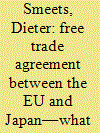| Srl | Item |
| 1 |
ID:
140093


|
|
|
| 2 |
ID:
146201


|
|
|
|
|
| Summary/Abstract |
This article examines the trade effect of flexibility design features within preferential trading arrangements (PTAs). Using a gravity model of bilateral trade that incorporates multilateral trade resistance, we report three main results. First, unconstrained escape provisions undermine the effectiveness of PTAs when it comes to increasing trade. Second, adding some restrictions to these escape provisions more than offsets the negative effect of unconstrained escape, leading to more effective PTAs than those without escape options. Third, adding more restrictions beyond a certain point serves only to make PTAs less effective. Thus, both too much institutional flexibility and too much institutional rigidity reduces the ability of PTAs to promote trade. However, fitting these results to the descriptive data makes it appear that most PTAs would be even more trade effective if they included greater restrictions on the use of their escape provisions. Consequently, it appears that policymakers generally choose fewer escape restrictions than would be optimal in terms of trade performance.
|
|
|
|
|
|
|
|
|
|
|
|
|
|
|
|
| 3 |
ID:
118172


|
|
|
|
|
| Publication |
2012.
|
| Summary/Abstract |
Do fair trade PTAs-trade agreements that contain provisions for protection of labor rights-lead to improvements in labor protection in PTA partner states? If so, how do the PTAs bring about such improvements? I argue that trade partner states are likely to engage in ex ante due diligence and improve the protection of labor rights at home before they sign or even enter into negotiations for a PTA. Given that large developed economies have increasingly placed value on strong labor protection, trade partners of these economies act on the belief that, holding other factors constant, having stronger labor protection will increase their attractiveness as a potential or a prospective PTA partner. I test this argument in the context of the United States and its trade partners between 1982 and 2005. The evidence shows that trade partner states indeed are much more likely to improve labor protection (i) prior to the 2002 Trade Act publicizing the importance of labor protection and (ii) prior to signing a PTA with the United States.
|
|
|
|
|
|
|
|
|
|
|
|
|
|
|
|
| 4 |
ID:
137814


|
|
|
|
|
| Summary/Abstract |
On their summit in May 2011, Japan and the EU decided to negotiate on a Preferential Trade Agreement (PTA). Against this background, the study at hand analyzes PTAs between the EU and third countries by estimating gravity equations on a sector basis consisting of 1-digit SITC groups. On the one hand, it concludes that—except for trade in agricultural goods—PTAs increase bilateral trade above its normal level. On the other hand, that trade between the EU and Japan is undoubtedly too low with regard to distance and size. Therefore, a free trade agreement between the EU and Japan should have a considerable potential to prompt trade-creating effects that increase welfare in both countries. A necessary condition to exploit these gains is, however, not only to abolish tariffs but, more importantly, to reduce nontariff measures to trade.
|
|
|
|
|
|
|
|
|
|
|
|
|
|
|
|
| 5 |
ID:
080977


|
|
|
|
|
| Publication |
2008.
|
| Summary/Abstract |
Does the dramatic rise of the number of preferential trade agreements (PTAs) worldwide make economic sanctions more likely through increasing the leverage of the powerful and pitting states against each other in competition (power) or less likely through increasing the benefits of trade, resolving disputes, and promoting like-minded communities (plenty)? The authors offer the first systematic test of these propositions, testing hypotheses on sanctions onset using a data set of episodes from 1947 through 2000. In favor of the plenty argument, increases in bilateral trade do decrease sanctioning behavior; in favor of the power argument, an increase in the potential sanctioner's GDP or centrality in the network of all PTAs make sanctioning much more likely. However, mutual membership in PTAs has no direct effect on the propensity of states to sanction each other
|
|
|
|
|
|
|
|
|
|
|
|
|
|
|
|
| 6 |
ID:
018070


|
|
|
|
|
| Publication |
Autumn 2000.
|
| Description |
775-808
|
|
|
|
|
|
|
|
|
|
|
|
|
|
|
|
| 7 |
ID:
066353


|
|
|